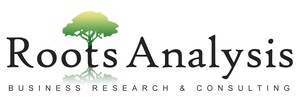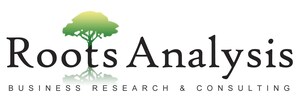LONDON, Dec. 11, 2023 /PRNewswire/ -- According to the recently published report by Roots Analysis, the growing preferences for gene-based therapies and genome editing tools for gene correction are driving the genome editing market.
Global Genome Editing Market Overview
The global genome editing market is estimated to be worth over USD 3.5 billion in 2023 and is poised to reach USD 14.5 billion by 2035, it is anticipated to grow at a compound annual growth rate (CAGR) of 12.6% during the forecast period (2023-2035).
Genome editing is a genetic engineering technique that allows the modification of genes or a set of genes by deletion, insertion, or replacement of genes inside genomic sequences. The technique is useful for treating genetic disorders such as sickle cell and autoimmune diseases. Due to gene editing tools' potential to correct genetic functions, several pharmaceutical companies are using genome editing to develop gene-based therapies. Genetic-based therapeutics such as CRISPR technology have garnered significant attention in recent years. Pharmaceutical companies have been employing gene editing technologies to ensure genome therapies' efficacy, precision, and safety. Driven by the ongoing trend of genetic-based therapies and increasing demand for genome editing tools, it is expected that the genome editing market will grow substantially during the forecast period, and the trend remains unchanged in the upcoming years.
You Can Download Free Sample PDF Copy of This Report at:
https://www.rootsanalysis.com/reports/genome-editing-market/request-sample.html
Market Drivers
The genome editing market is likely to grow during the upcoming years due to the increasing demand for genome editing tools and technology. Several other factors drive the market, including the increasing usage of genome editing applications for developing personalized medicines and forensic science. Moreover, genome editing technology is broadly used in drug discovery and treatment of human genetic disorders. Driven by the growing usage of genome editing applications, the genome editing market is expected to grow during the upcoming years.
Market Restraints
Some market restraints that restrict the growth of the genome editing market include the off-target effects of CRISPR technology and gene therapies. Though gene-based therapies help correct genetic defects with precise targeting, they may cause unintended modifications and off-target effects. It can lead to side effects and potential risks that hinder the treatment. Additionally, the cost associated with the development of genome editing technology further restrains the market in the upcoming years. Therefore, pharmaceutical companies have to bring advancements in genome editing technology to mitigate the problem of off-target effects.
Growth Factors
Despite several market restraints, the expanding research pipelines for genetic therapies that involve genome editing tools represent significant opportunities for driving the market in the future. Gene-based therapies involve gene editing tools to make precise cuts at the targeted sites to correct genetic diseases and restore normal function. The increasing number of gene therapies and the requirement for genome editing tools will drive the market in the upcoming years.
Genome Editing Market Segments
Based on the type of gene editing technology, the market is segmented into CRISPR-Cas System, TALENs, Meganucleases, ZFNs, and Other Techniques
- 83% of the market share will be held by the CRISPR-Cas system by 2035.
- The TALENs is likely to grow during the forecast period, capturing 7% of the market share by 2035.
Based on the type of gene therapy, the genome editing market is segmented into cell therapies, gene therapies, and other therapies.
- The cell therapies will dominate the genome editing industry, capturing 52% of the market share by 2035.
- 43% of the market share will be held by the gene therapies segment by 2035.
Based on the gene editing approach, the genome editing market is segmented into gene knock-out approaches and gene knock-in approaches.
- Gene knock-out approaches segment will dominate the market, capturing 57% of the market share by 2035.
- 43% of the market share will be held by the gene knock-in approaches segment by 2035.
Based on the type of gene delivery method, the genome editing market is segmented into ex-vivo delivery methods and in-vivo delivery methods.
- Ex-vivo segment is likely to capture 57% of the market share by 2023.
- The in-vivo delivery will drive the market and is anticipated to hold 43% of the market share by 2035.
Based on the gene delivery modality, the market is segmented into viral vectors and non-viral vectors.
- The non-viral vector dominates the genome editing market during the forecast period, capturing 51% of the market share by 2035.
- The viral vector is anticipated to hold 49% of the market by 2035.
Based on the application area, the market is segmented into drug discovery and development and diagnostic segments.
- The drug discovery and development drive the genome editing market, capturing 81% share of the market by 2035.
- The diagnostic segment holds 19% of the market share during the forecast period.
Based on the end user, the genome editing industry is segmented into pharmaceutical companies and biotechnology companies, and academic and research institutes.
- Pharmaceutical and biotechnology companies dominate the market, capturing an 80% share of the genome editing market by 2035.
- Academic and research institutes will grow during the forecast period 2023-2035, capturing 20% of the market share by 2035.
Based on the Regional Insights, the genome editing market is segmented into North America, Europe, and Asia Pacific.
- The North American region is likely to grow during the forecast period, capturing 73% of the genome editing market share by 2035.
- The European segment is anticipated to grow substantially at a higher CAGR of 14.3% during the forecast period (2023-2035) and capture 15% of the market share by 2035.
Based on the Payment Method Employed, the genome editing market is segmented into upfront payment and milestone payment.
- Milestones payment will dominate the market during the forecast period, capturing 67% of the market share by 2035.
- 33% of the market share will be held by upfront payment by 2035.
Key Companies Profiled
The market report also includes a detailed profile of the key players (listed below) that offer genome editing tools, including:
- Arcturus Therapeutics
- Avectas
- Beam Therapeutics
- Bio-Sourcing
- Caribou Biosciences
- Century Therapeutics
- CRISPR Therapeutics
- EdiGene
- Editas Medicine
- Flash Therapeutics
- Fortgen
- G+FLAS Life Sciences
- Graphite Bio
- Intellia Therapeutics
- Ntrans Technologies
- OXGENE
- Prime Medicine
- Revvity (formerly known as Horizon Discovery)
- TargetGene Biotechnologies
- Vor Biopharma
- ZeClinics
You Can Also Ask a Question about the Genome Editing Market by Clicking on the Given Link https://www.rootsanalysis.com/reports/genome-editing-market/ask-question.html
Don't Miss Out on Other Interesting Titles:
Plasmid DNA Manufacturing Market by Scale of Operation, Application Area, Therapeutic Area, and Geography: Industry Trends and Global Forecasts, 2023-2035
ADC Technology Market: Focus on ADC Linker and ADC Conjugation Technologies (2nd Edition) - Distribution by Generation of ADC Technology, Type of Conjugation, Type of Linker and Key Geographical Regions: Industry Trends and Global Forecasts, 2023-2035
Genotoxicity Testing and Mutagenicity Testing Services Market: Distribution by Type of Assay, Assay / Test Offered, End User Industry and Key Geographical Regions: Industry Trends and Global Forecasts, 2023-2035
Medical Aesthetics Market - Distribution by Type of Product and / or Device Offered (Botox, Dermal Fillers, Chemical Peels, Body Contouring, Gluteal Implants, Hair Removal, Breast Implants and Other Products and / or Devices), Type of Procedure (Non Invasive, Minimally Invasive and Invasive), End User (Hospitals, Clinics / Med Spas and Dermatology / Cosmetology Centers, and Other end users), Gender (Male and Female), Distribution Channel (Direct Distribution and Indirect Distribution), and Key Geographical Regions (North America, Europe, Asia-Pacific, Middle East and North Africa, and Latin America): Industry Trends and Global Forecasts
Cell Line Characterization and Cell Line Development Market (3rd Edition), 2019-2022 (Historical Trends) and 2023-2035 (Forecasted Estimates): Distribution by Source of Cell Line / Expression System (Mammalian, Microbial, Insect and Others), Application of Cell Line (Research and Development, and Biomanufacturing), Company Size (Small, Mid-Sized, Large) and Key Geographical Regions (North America, Europe, Asia Pacific and Rest of the World): Industry Trends and Global Forecasts
About Roots Analysis
Roots Analysis is a global leader in the pharma/biotech market research. Having worked with over 750 clients worldwide, including Fortune 500 companies, start-ups, academia, venture capitalists, and strategic investors for more than a decade, we offer a highly analytical / data-driven perspective to a network of over 450,000 senior industry stakeholders looking for credible market insights. All reports we provide are structured to enable the reader to develop a thorough perspective on the given subject. Apart from writing reports on identified areas, we provide bespoke research/consulting services dedicated to serving our clients in the best possible way.
Contact Us
Gaurav Chaudhary
Roots Analysis
+1 (415) 800 3415
Email: gaurav.chaudhary@rootsanalysis.com
Web: https://www.rootsanalysis.com/
Follow Us: LinkedIn| Twitter
Logo: https://mma.prnewswire.com/media/742223/Roots_Analysis_Logo.jpg






Share this article